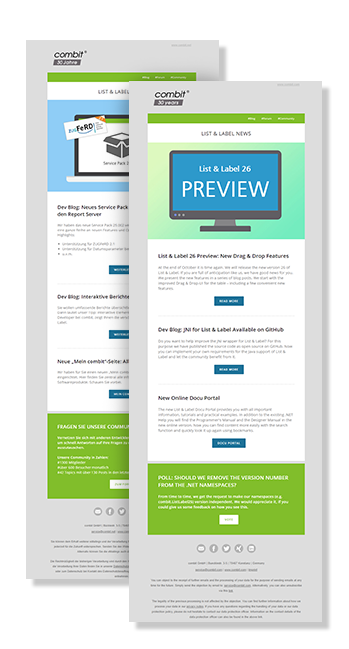
First step: AI integrated into everyday life
In both our development and marketing departments, we have started to integrate AI tools like ChatGPT into daily work processes. These technologies have not only increased our efficiency, but allow us to automate repetitive tasks so we can focus on more important projects.
Own solutions: DocBot and AI-based applications
At combit, we also developed our own solutions, based on AI. An outstanding example is our DocBot, which runs via an OpenAI interface. This bot-based documentation assistant makes it easier for our own developers and customers to access technical information. It suggests appropriate answers and thus improves interaction with our technical documentation. We are supported in the forum by a chatbot that automatically suggests relevant posts and double-checks replies, thereby ensuring a better user experience.
We also implemented on-premises solutions, using freely available open source Large Language Models (LLMs), hosted on our servers on-premise. This means we can also use AI in data-sensitive environments, for example to serve user cases with stricter data protection requirements such as GDPR.
ChatGPT and CustomGPT in marketing
AI has become an integral part of our marketing team. Since the introduction of CustomGPTs, we have trained a “Product Expert List & Label” GPT who integrates specific product knowledge and operates at a high technical level. The marketing team now uses various CustomGPTs and other generative AI tools for tasks such as product documentation, target group targeting and multilingual content. These configurations initially take some time, but pay off in terms of efficiency during ongoing operations.
GitHub Copilot in development: “I love it when a plan comes together.”
GitHub Copilot has been an integral part of the workflow in the development department for a long time. AI-powered suggestions and automation of routine tasks allow developers to focus their time on more complex tasks. Tools like ChatGPT are also used to accelerate processes or recognize patterns in recurring tasks. Specially trained GPTs support us with refactoring or working with specialized frameworks. In addition, we use AI models to efficiently create changelogs and to precisely document changes to our software with comparatively little work.
Opportunities and challenges
AI brings opportunities such as increased productivity and optimized work processes, but also challenges. These include possible distortions in the results or incorrect information, the so-called “hallucinations”. Data protection and data security are also crucial issues that require careful attention. Our solution is to use AI models locally to minimize these risks and maintain full control over data processing.
Focus on the future: This is how we continue to advance AI at combit
Here at combit, we see great potential in the use of AI and have already achieved considerable increases in productivity. But of course the question is: How can we further optimize our work together with AI? Which tools could make our products and services even better? We look forward to taking the next steps together with you and continuing to shape further developments in the field of AI. Working on new generations of our products also greatly benefits from the support of AI – more information on this matter will be available soon.




